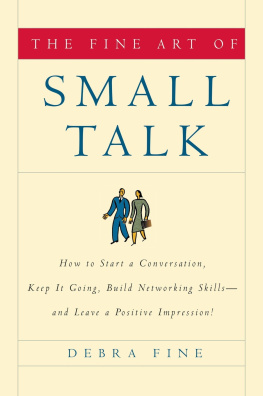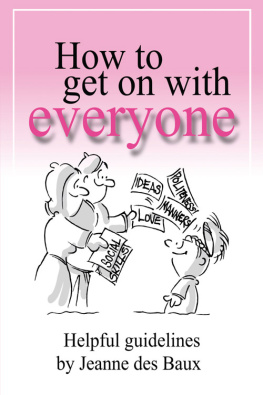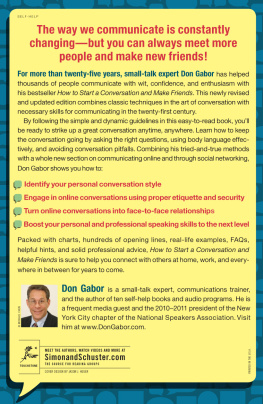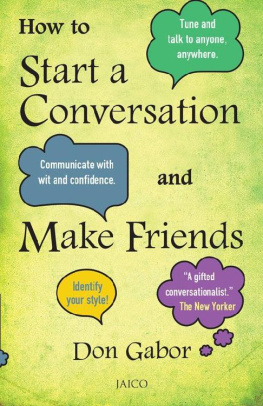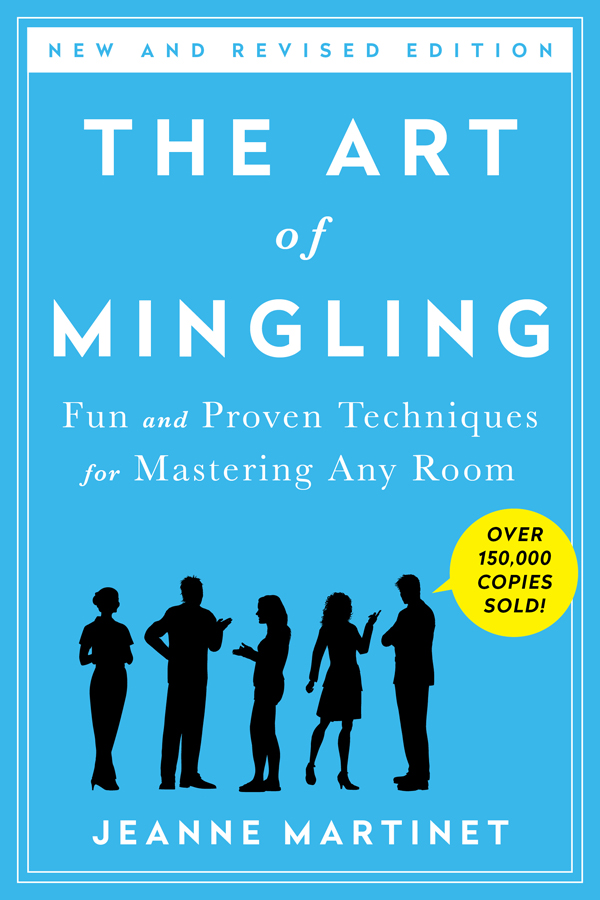Contents
Guide

The author and publisher have provided this e-book to you for your personal use only. You may not make this e-book publicly available in any way. Copyright infringement is against the law. If you believe the copy of this e-book you are reading infringes on the authors copyright, please notify the publisher at: us.macmillanusa.com/piracy.
To Jason: Best friend and ex-minglephobe
First of all, I am grateful to all the hostesses and hosts who ever invited me to a cocktail party or other social gathering. I really do wish I could name them all, as well as everyone who has ever given me a mingling tip or a great party story, but that would fill a separate book (or even two). If you are one of these people, please know how much I appreciate it. I am also forever beholden to my gregarious parents; those childhood summer band parties on our lawn and opera soirees in our club basement gave me my first taste for mingling.
Last but not least, a special thanks to everyone at St. Martins Press, especially my supremely wonderful editor, Hannah Braaten.
Like all my best ideas, The Art of Mingling was born on a cocktail napkin.
It happened in the wee hours of the morning after a wedding in Dayton, Ohio, while I was hanging out with college friends. We were performing a group postmortem on the reception, when suddenly my friend Larry said, almost accusingly, Hey Jeanne, how did you manage to meet everyone in the entire town? The rest of us only talked to people we already knew. And so, more to entertain than to instruct, I proceeded to jot down on a napkin some of my favorite mingling techniques (which until that point in time I never knew I had names for) while I described their execution. To my amazement my friends were not only amused but actually seemed hungry for this information. Thats when I realized that there were probably a lot of other people eager to discover these time-tested mingling methods.
Still, when The Art of Mingling was first published in 1992 I was not completely aware of how much mingling-related fear existed out there. In identifying this pervasive social phobia and in offering my own personal system for socializing at parties, it seems I had struck a societal nerve. In fact, most of the people I talk to seem to want to learn how to become better, more confident minglers. Over the years even some TV talk-show hosts, radio personalities, and top executives have revealed to me that not only are they terrified of making small talk with strangers, but also that my lighthearted, down-to-earth approach appealed to them.
Unfortunately, in todays society our mingling muscles are becoming more and more atrophied, in part due to the enormous shift in the way we connect with each other. In the nine years since the last edition of this book, the now-iconic iPhone came into being, Twitter was createdand now has 271 million active usersand Facebook went from having 12 million users to over one billion. About 60 percent of U.S. adults now have smartphones; the average American spends about 11 hours a day with electronic media. The Internet is arguably the greatest people-connecting invention of our time, but are we really connecting? We can have conversations, business meetings, drinks, sex, or fights with peopleall anonymously, and all online. But as far as face-to-face interaction goes, our aptitude is only decreasing.
For the last nine years I have been collecting brand-new mingling techniques, tips, and lines that I have incorporated into this updated edition in order to offer the reader more relevant social options and guidelinessuch as the sections on the Secret of Listening, the Dumb Use of Smart Phones, and the After-Party: Instructions for Following Up. Mingling methods may be the same as they ever were, but the accoutermentsthe menus and venues of minglersare always changing. After all, there is a reason temporary is part of the word contemporary.
I think most of us are aware that we need to keep improving the way in which we relate to each other as the world becomes more crowded, and more technologically advanced. The Art of Mingling started out as a humorous treatise on a subject I was passionate about, but by now it has become more or less my mission in life: to get people out there talking to each otherand by that I mostly mean talking to people they dont know (yet). Entering a room full of strangers is both wonderful and scary, like traveling to a foreign country. As with any other kind of exploration, its always safer if you stay home, but remember: Nothing can be gained if you dont venture out into the unknown, and fewer things in life are more delicious than engaging, spontaneous conversation with someone new.
You are at a cocktail party. The guests are glamorous, the food is fabulous, the dcor is divinenothing could be more wonderful, right?
Wrong. Its a nightmare. You want desperately to disappear. Everywhere around you are people who seem to know each other. They are talking and laughing, having a great time, while you are standing all alone, wishing with all your heart and soul that you were somewhere elseanywhere elsebut here. Two firm convictions keep you from dying on the spot: (1) You are definitely going to take the life of the friend who somehow convinced you that you needed to expand your horizons by coming to this party. And (2) If this night ever ends, you will never ever leave the safety of your home again.
An exaggeration? Maybe. But I know plenty of people, of all ages and from all walks of life, who are perfectly comfortable with one-on-one or small-group social interactions but confess to a secret terror of medium to large parties of any kind. The very idea of having to talk to a lot of people they dont know makes them go dry in the mouth. Theyll do anything to avoid mingling situations. Many opt out, telling themselves they are skipping the party because they have too much to do at the office or that they are too tired to goeven that they have nothing to wear. Others, the self-diagnosed introverts of the world, tell themselves big parties are just not their thing. This kind of avoidance is a shame bordering on a tragedy, because larger affairs, whether they be business or social functions, are potentially more exciting and energizing than small get-togethers. They are fertile arenas for meeting new and interesting people (I met a woman at a fund-raiser fifteen years ago who became one of my best friends). And yet, simply because of apprehension or aversion, people often waste these opportunities either by not going to the party, or by going with a colleague or companion and never leaving their side. Anything, they think, is better than to risk being left standing all alone looking pathetic. And even that is preferable to suffering the incomparable, utter agony of being face to face with a stranger and not knowing what to say.
People who feel this way (and there are more of them out there than you might imagine) have a widespread disease known as minglephobia . Is there a cure? Yes. Because contrary to what you might think, making small talk, being a social butterfly, or working the room is a learned arta simple onethat anyone can master.
Its true that social skills seem to come more easily to some than others, and there are a lucky few who are actually born mingling geniuses (in fact, I once saw a small child work a room so well it was scary). But most people have to practice. With practice, even the pathologically shy, as well as the more common tongue-tied or foot-in-mouth types, can learn simple tricks, lines, and maneuvers that can mean the difference between misery and funbetween a night of feeling out of place and a night of feeling socially triumphant.


